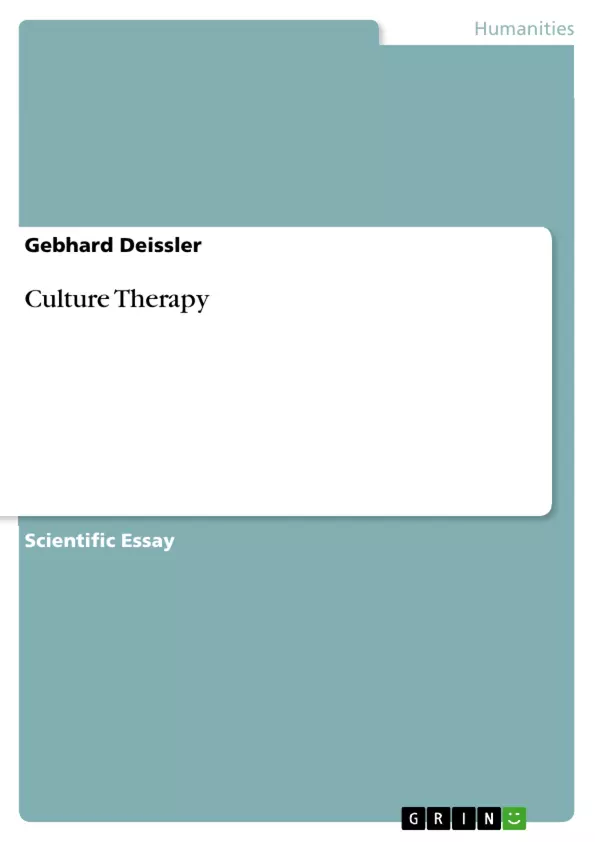From cultural specifics and therapies and sectoral efforts I am trying to lead towards an integrated perception of the whole which is the only sustainable therapy for world affairs, cultural and others. This shift of attention to expand the human horizon to the integrative and binding power of human consciousness with regard to the members of the human kind is the true cure for man’s condition, cultural and beyond.
Inhaltsverzeichnis
- CULTURE THERAPY
- THE TRANSCULTURAL MANAGEMENT MODEL
- THE TRANSCULTURAL PROFILER
- Culture is a structural and functional part of the individual.
Zielsetzung und Themenschwerpunkte
This essay explores the concept of "culture therapy" and its potential applications in managing cultural conflicts and promoting individual and societal well-being. It introduces the Transcultural Profiler, a diagnostic tool designed to assess and address cultural imbalances within individuals, organizations, and societies.
- The importance of cultural awareness and sensitivity in a globalized world.
- The potential for cultural conflicts to disrupt societal stability.
- The concept of "culture therapy" as a means of preventing and addressing culturally-based conflicts.
- The Transcultural Profiler as a diagnostic and therapeutic tool for cultural imbalances.
- The role of cultural identity in individual well-being.
Zusammenfassung der Kapitel
- CULTURE THERAPY: This section introduces the concept of culture therapy, contrasting it with ethnopsychiatry and transcultural medicine. It highlights the growing importance of cultural awareness in healthcare and society due to increasing multiculturalism and migration. The need for professionals to develop a deeper understanding of cultural nuances is emphasized.
- THE TRANSCULTURAL MANAGEMENT MODEL: This section presents the Transcultural Profiler as a diagnostic and therapeutic tool for individuals, organizations, and societies. It discusses the potential for cultural imbalances to disrupt system equilibrium and the need for intervention.
- THE TRANSCULTURAL PROFILER: This section provides a detailed description of the Transcultural Profiler, outlining its hierarchical structure and its various levels of analysis. The tool aims to assess cultural factors impacting individuals, organizations, and societies, and to identify potential areas for intervention.
- Culture is a structural and functional part of the individual.: This section explores the connection between culture and individual well-being, arguing that a person's cultural identity is integral to their physical and mental health. It discusses the negative consequences of cultural alienation and the need for individuals to live in accordance with their cultural heritage.
Schlüsselwörter
Culture therapy, Transcultural Profiler, cultural awareness, cultural identity, cultural conflict, societal stability, multiculturalism, migration, globalized world, health, healthcare, mental health, well-being, individual, organization, society, diagnostics, therapy, equilibrium, cultural imbalances, cultural alienation.
Frequently Asked Questions
What is the concept of "Culture Therapy"?
Culture therapy is an approach aimed at resolving cultural conflicts and imbalances by expanding human consciousness toward the integrative power of shared human identity.
What is the Transcultural Profiler?
The Transcultural Profiler is a diagnostic tool designed to assess cultural imbalances within individuals, organizations, and societies to promote stability and well-being.
How does culture affect individual health?
Culture is considered a structural and functional part of the individual. Cultural identity is integral to mental and physical health, and alienation from it can lead to negative health consequences.
Why is transcultural management important in a globalized world?
Increasing multiculturalism and migration require professionals to understand cultural nuances to prevent conflicts and maintain societal equilibrium.
How does culture therapy differ from transcultural medicine?
While transcultural medicine focuses on healthcare delivery across cultures, culture therapy aims for a more integrated perception of world affairs as a sustainable "cure" for the human condition.
- Quote paper
- D.E.A./UNIV. PARIS I Gebhard Deissler (Author), 2010, Culture Therapy, Munich, GRIN Verlag, https://www.grin.com/document/160151



